Scrambling to London

No, not every day was that sunny and that amazing. But that afternoon, it absolutely was.
Methods and morals (how and why)
On March of 2022, while the world is going even crazier than it has been for the past years, I decided to bring home (my 🇬🇧 one) my lovely new Benelli Leoncino Trail motorbike, which I had bought in Italy for a number of reasons(1). One the tiny detail though is that between my UK home and my Italian home there's almost 2k kms..
(1) The main reasons being price, and the fact that I already had an Italian car driving license and I could exercise on my own bike for the practical test to get the A3 license.
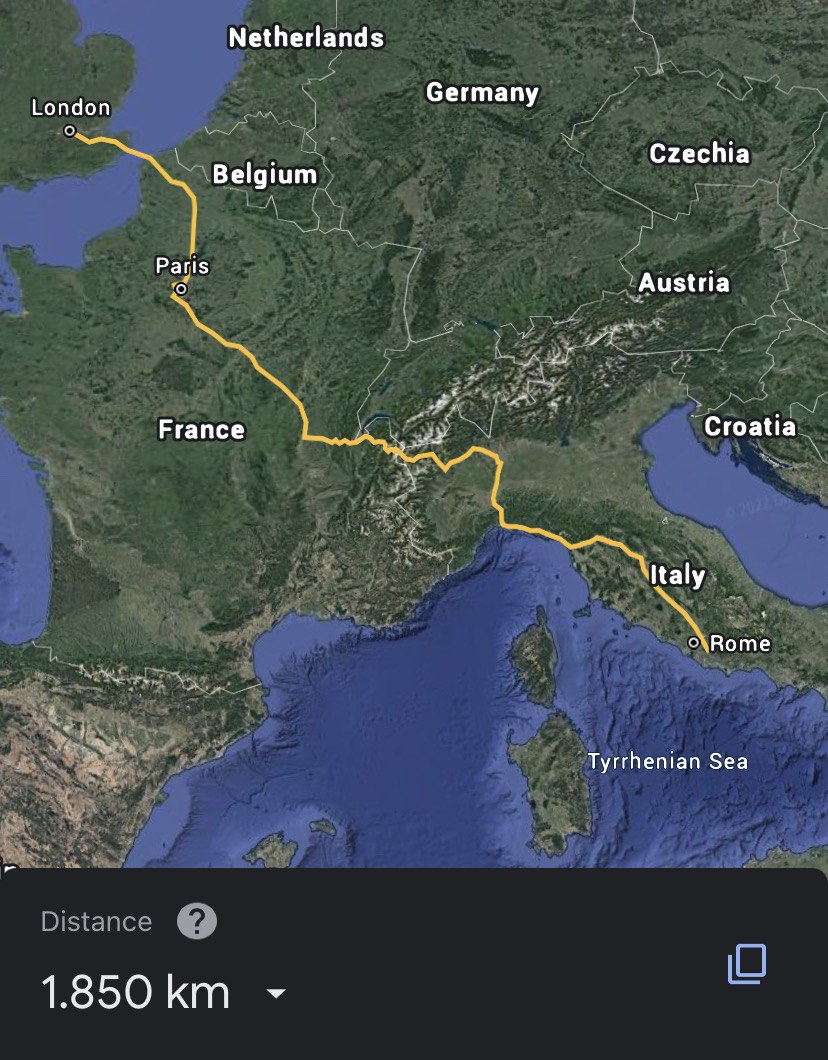
So the alternative was either to ship my bike.. or go with her.
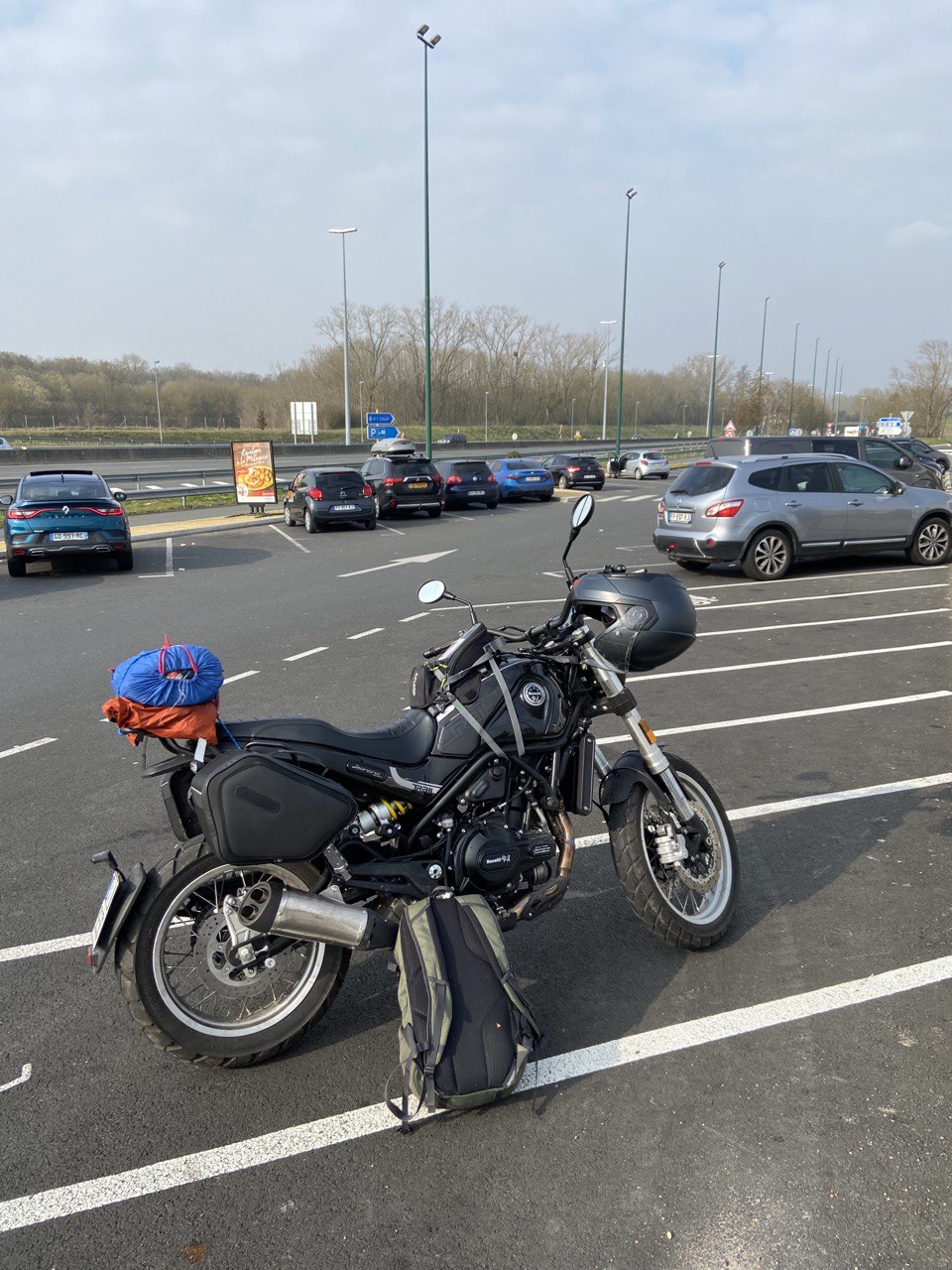
This^ ain't no BWM GS
Arrived at this fundamental crossroad some people would pose a methodological question:
How can a single man, riding a 500cc scrambler motorbike without a windshield, go all the way from Rome to London?
Other people might instead focus on another (moral) question:
Why would a single man, riding a 500cc scrambler motorbike without a windshield, go all the way from Rome to London?
I think these are interesting questions, that some people might ask almost absent-mindedly, with a bit of a "I-am-joking-but-you-are-mad-dude" expression on their face, but in fact reveal a lot more of who we are / our expectations from life than what we might think. So that's why Methods and Morals of these types of adventures is what I'll focus on this blogpost.
Morals
It seems to me that morals should be addressed first – why even bother about how to do something if you're not really sure why you should do it in the first place?
Why is it even a moral question? To me every 'why' always smells a bit moral-y. In this case, it feels that what we're really asking is: what ought we to do with these trips? Why are they any good at all? Morals generally deal with rights and wrongs, and one way to reply to a 'why' question is to say: this feels like the right thing to do, that's why I'm gonna do it. As simple as that. Gödel might say that these trips are "positive" : it is better to do them than not do them.
But how do you motivate that something is the right thing to do? Without wandering too much into the whole Metaphics of Quality painted in ZAMM, of which I am quite a fanboy, I would say that taking such a trip is a way for me to get close to Quality (aka Beauty), get un-stuck from my daily routine and be back to just living.
How does one justify such a answer? It's nothing that can be condensed on the intellectual level, because there is absolutely nothing practical or intellectually sound in just deciding that – instead of shipping your bike (it's 2022, so there's plenty of practical ways to do it) – you should instead spend more or less the same amount of money but considerable more time and ride it all the way, exposing yourself to the countless risks (speed, wind, rain, cold..) of such a trip.
Why don't you go in a hotel, instead of camping? Why don't you prefer the comfort of a nice warm house? Why would you rather be in that damned little orange tent in the middle of nowhere?
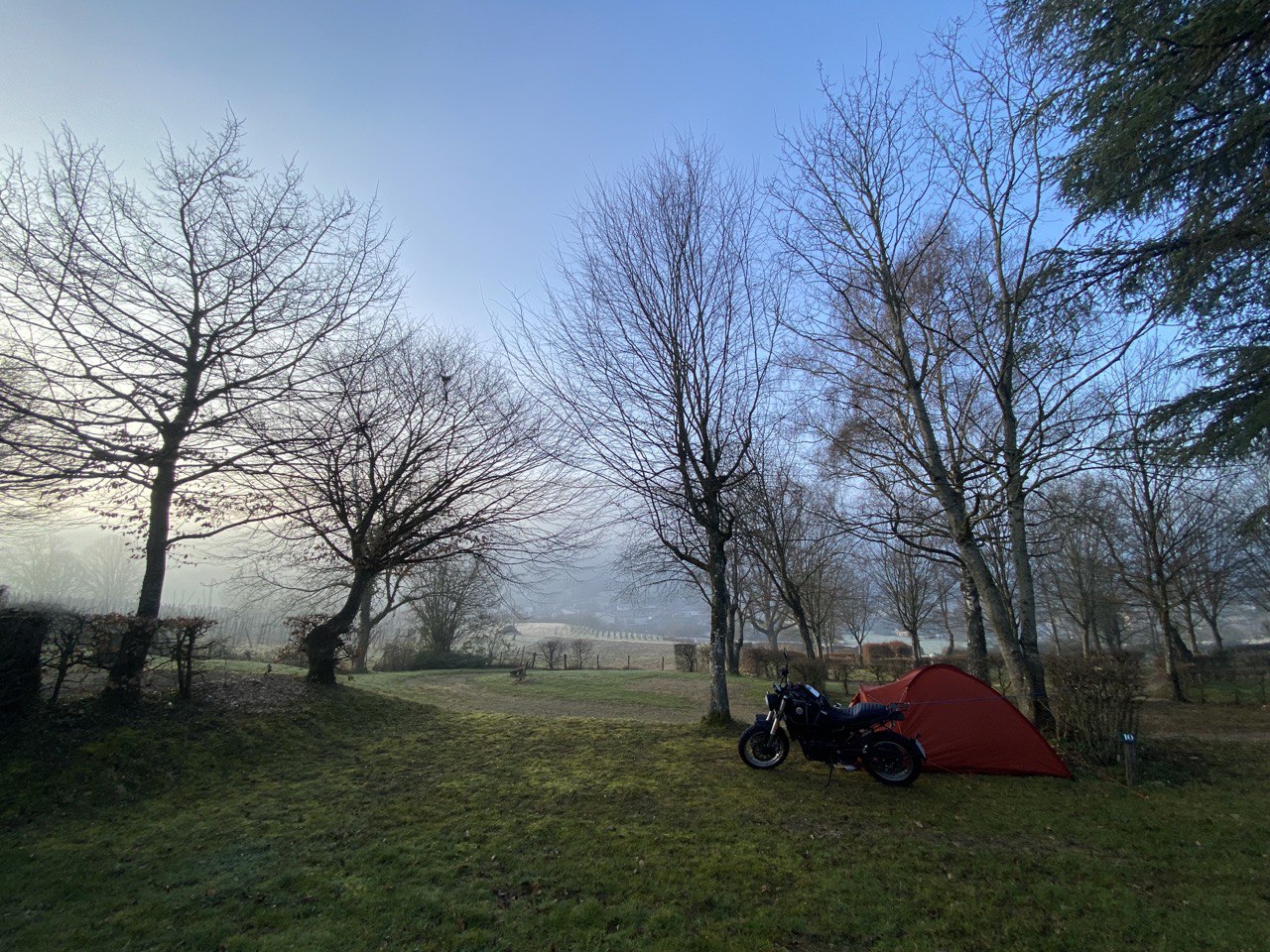
An example of a little orange tent in the middle of nowhere (in the south of France)
What I have found really motivates me when taking these decisions is that pre-intellectual tickling that I get just by thinking and fantasizing about it, that is, just thinking about living just in the 'here and now' for a while, just feeling the space around you, just focusing on your senses, without any mediation, just being there, in pain or in pleasure (although pain is a big part of properly sensing pleasure - too much pleasure at once and you're just lost as without any pleasure).
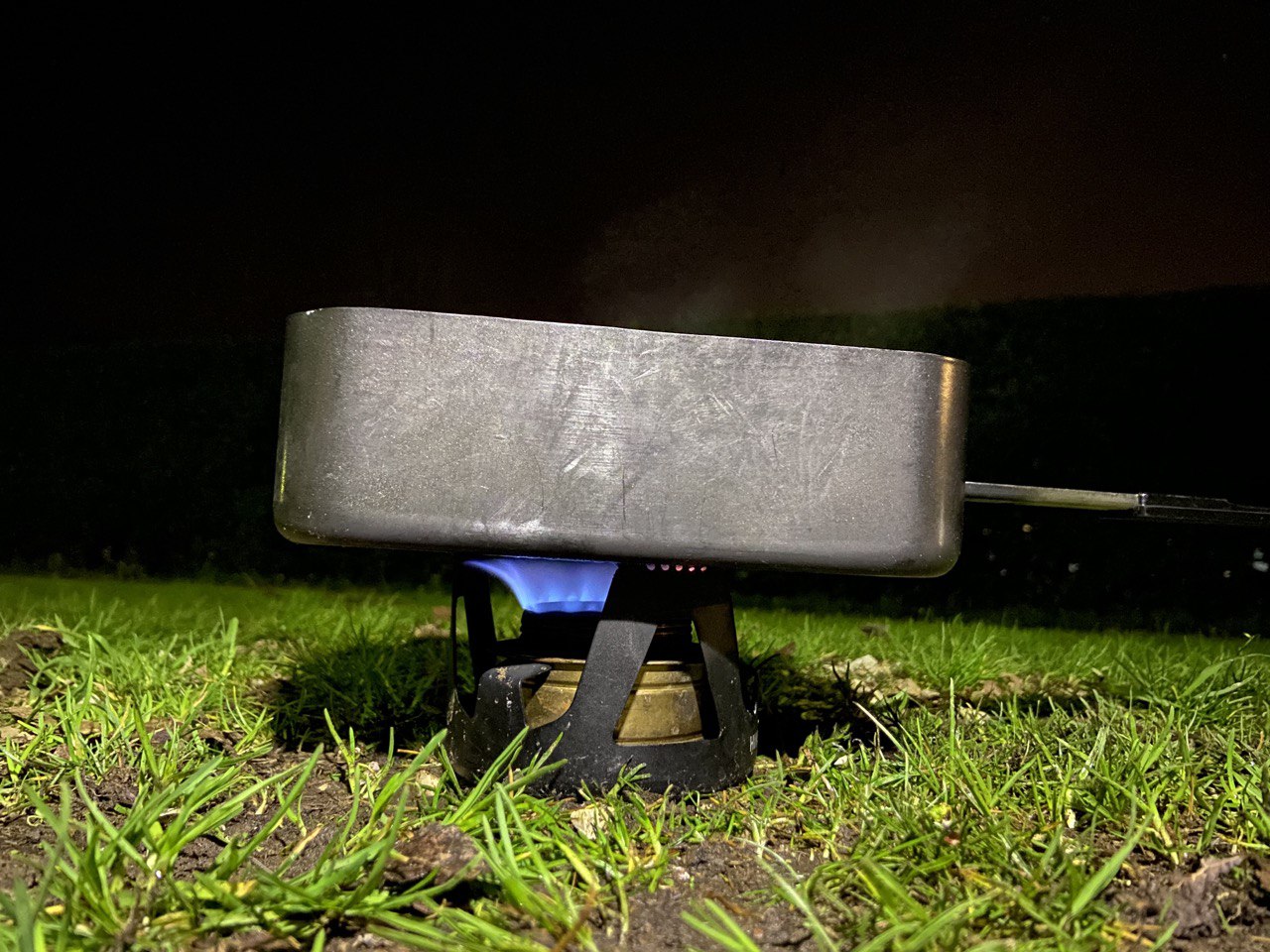
Cooking on an alcohol stove: unmissable ✅
Some people might just say that it's an 'irrational' call, and while 'irrational' might be one word to describe this type of search for pure feelings, I think that 'irrational' almost seems to be in conflict with rationality, while motorbiking consists also of an absolute exercise of rationality. If you're not rational when you're riding at 130km/h and cars and lorries pass by you, you just die. Every choice you make is a dance between feelings and the technical control of the motorcycle. For this reason I really prefer the terms 'pre-intellectual' and 'pre-rational'. The feeling of the road passing just below your feet happens before you can rationalize in any way and is not in contrast with reason - rationalizing will eventually (and inevitably) happen later, it happens when the road below you has a pothole that you want to avoid, and your brain starts doing all the magic coordination game with your nerves and muscles in order to avoid that pothole and a subsequent crash. The brain will feed on this sensory data that has been given to it from our body and it then translates it into something 'meaningful'.
All of this playing on words is just to say what can't really be expressed formally, all that might be hinted only, the un-speakable feeling of 'riding'. I hope I gave a vague feeling of 'why' one goes into such trips. It is a moral call of the adventure aesthete. It's all about the things we can't express about these trips, about their poetry, their art, the way the balance their rational and non-rational componenents. Maybe if we could express their reasons in a reason-friendly way, maybe then reason alone would be enough for us, and we wouldn't long for these experiences.
Good old (but early) Witt said a few things that I think better express what I mean:
4.11 The totality of true propositions is the whole of natural science (or the whole corpus of the natural sciences).
4.111 Philosophy is not one of the natural sciences. (The word "philosophy" must mean something whose place is above or below the natural sciences, not beside them.)
4.112 Philosophy aims at the logical clarification of thoughts. Philosophy is not a body of doctrine but an activity. A philosophical work consists essentially of elucidations. Philosophy does not result in "philosophical propositions", but rather in the clarification of propositions. Without philosophy thoughts are, as it were, cloudy and indistinct: its task is to make them clear and to give them sharp boundaries.
4.114 It must set limits to what can be thought; and, in doing so, to what cannot be thought. It must set limits to what cannot be thought by working outwards through what can be thought.
When I do these trips, I walk right along the edge of the natural sciences and rational thinking, on the verge of what can be thought / what cannot be thought. I embrace thoughts (=feelings) before they become too sharp. I like my thoughts to be dull, sometimes.
And also, when he finally (un)speaks about ethics, and why some things can't just be formally put into words:
7 Whereof one cannot speak, thereof one must be silent.
For those that are wondering, this^ doesn't really mean that if you don't know something, you should shut up (altough it generally helps). Instead, it points to the vast amount of unspeakable/unexpressable statements that rational thinking cannot encompass, and which is what art feeds upon.
See also: Proposition 7
Methods
With the why out of the way, I wanted to also briefly discuss the how. How does one embark upon such an adventure and make the best of it? I don't really know. What I know is just the few – very practical – things that I have learned in my adventure. Your mileage may vary (literally.)
1. Gas and tolls will probably be your top expense
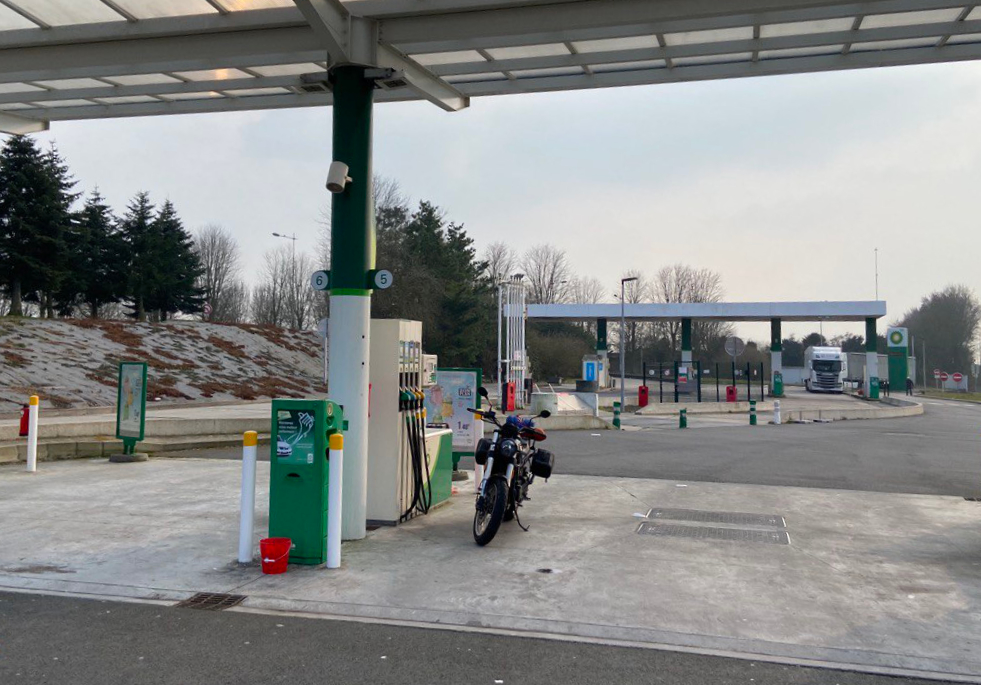
Depending on the size of your tank, this^ might end up being a recurring view..
Sadly, I'm still running on petrol. And I will be for a while, unless until I'll have a bit more time and money to explore the cutting-edge world of electric motorcycles.
And sadly, I'm also running with considerable time limitations (not a full time adventurer!), which means that sometimes a highway is the most-practical solution to get from point A to point B without riding at night, of for too long.
All of this means that most of my daily budget was spend on filling up my bike with gas, and paying motorway tolls. I remember that I spent around 30/40 euros everyday for both. Of course, the days that I was lucky and could run on lovely B roads, I would spend a lot less (and enjoy it a lot more!).
So that take into account - apps like Viamichellin can help you get a feeling of how much the tools+fuel will cost you, give them a go before it's too late.
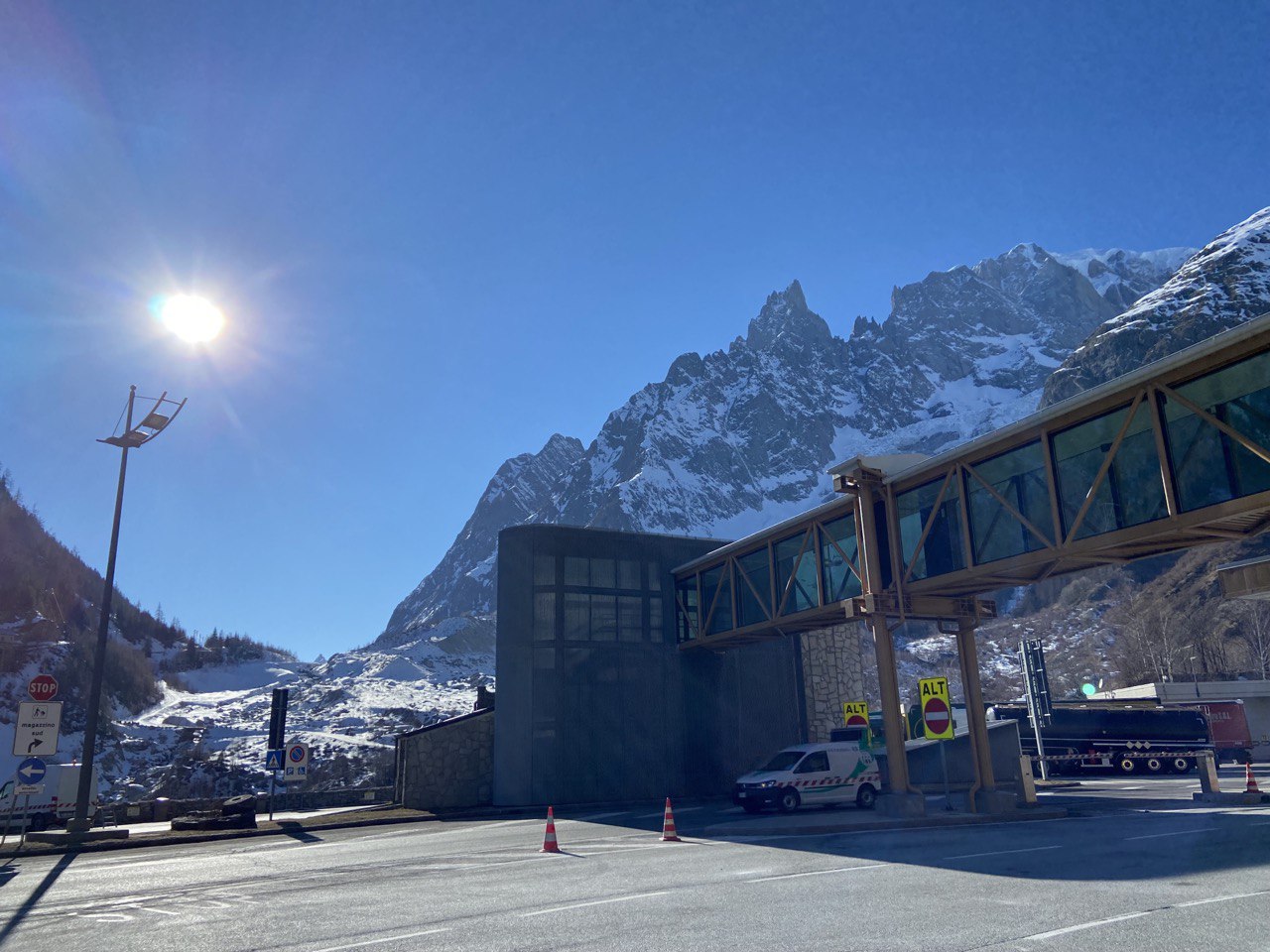
Some border crossings might be more interesting than others :)
2. Establish soon how much you want to ride
How much of your journey is about staying on the bike, and how much is it about exploring the people and the places?
It's a delicate and personal balance that you absolutely need to take into account when planning your adventure since it will set the pace of everything.
For me, 3-4 hours a day was a good tradeoff. There were days where I had to ride 6-7 hours, and I mostly remember them as buffers in between the more interesting days. It's also one thing to ride on highway tarmac than it is to ride on the not-so-well-maintained-but-lovely B roads of the various towns you'll pass by.
Keep in mind that if you want to take a 10-15 minutes pause every 1 hour of riding, you have that 4 hours of riding actually mean 5 hours to get somewhere. And trust me, when it's cold and windy, after 1 hour you'll body temperature will drop so low that you will absolutely need to stop.
Consider a healthy 7-8 hours of sleep plus 2-3 hours for dining, and that leaves you a good 8 hours for goofing around and exploring places.
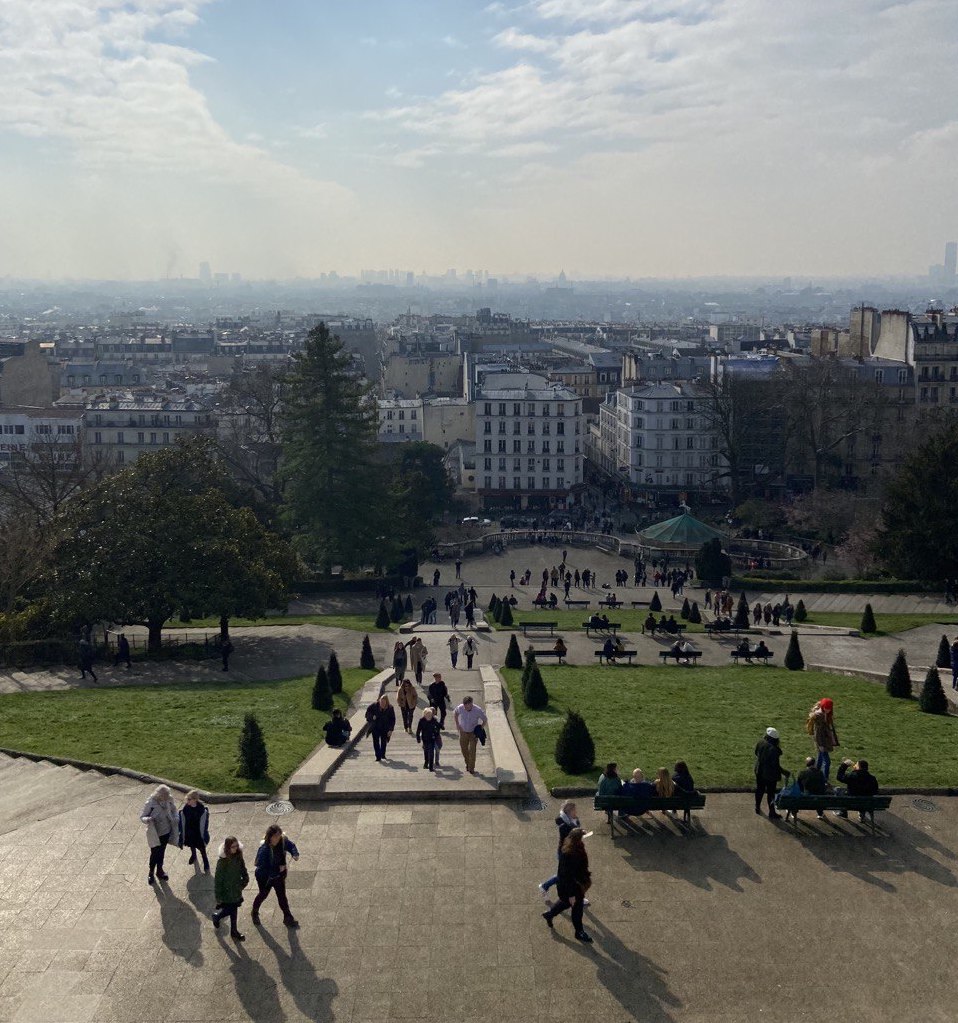
View from Montmartre during my quick incursion into Paris. Paris: I'm gonna come back for more!
3. Campings > hotels/motels/etc.
Now let's speak about the most important need to satisfy: a roof on your head.
This is my (for some people, controversial) take: (for me) camping is the ultimate experience.
Read this well: not some fancy-bed-equipped yurta in a 5 stars camping, not a luxury campervan, or a cozy hotel room. I want just to pitch my tent by myself, and feel that I'm part of the world in the most barebones way.
Camping allows me to be the most flexible: I can aim for a city camping if I want, but if I don't find anything, I can just try to wild camp somewhere and call it a day.
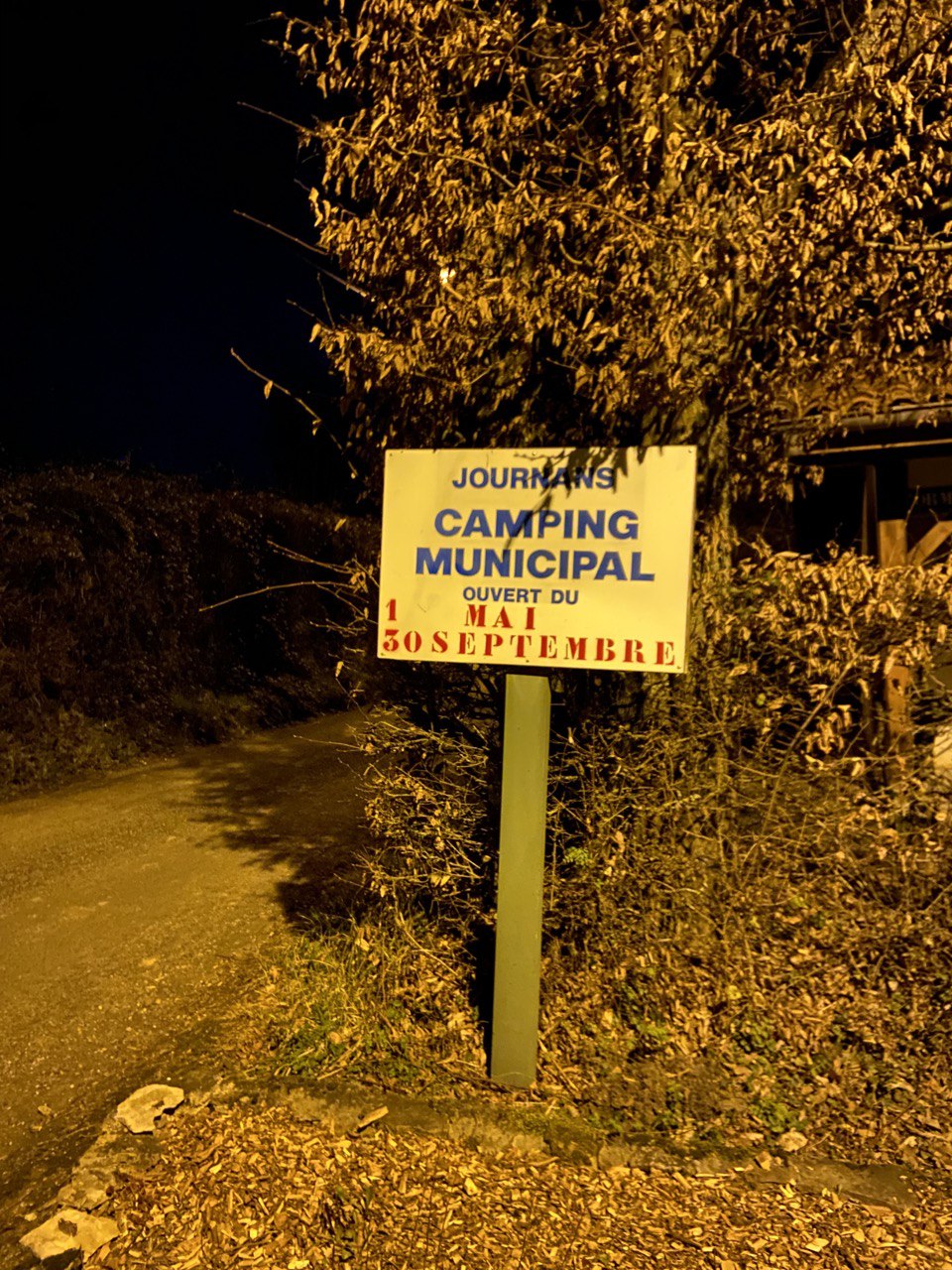
What if it's past 8pm and you find that the camping you were aiming for is closed until the good season? Guess who's gonna wild camp tonight..
Camping lets me do my own cooking in peace, which means warm food at a reasonable price.
hey! yes, you - do you like rice? you're gonna love it!
Camping lets me detach from a world full of busy bees, and just be.
I just ride until I want, look for a place where to camp, pitch a tent, cook and then call it a day. The night takes over and all of its lovely inhabitants come to life - it might be sketchy, but it makes you feel alive.
So if you have a good sleeping bag (covering the range of temperature that you'll be in at night, which in March could well be -5 even in Central Europe), and a good tent, try it. You might not come back.
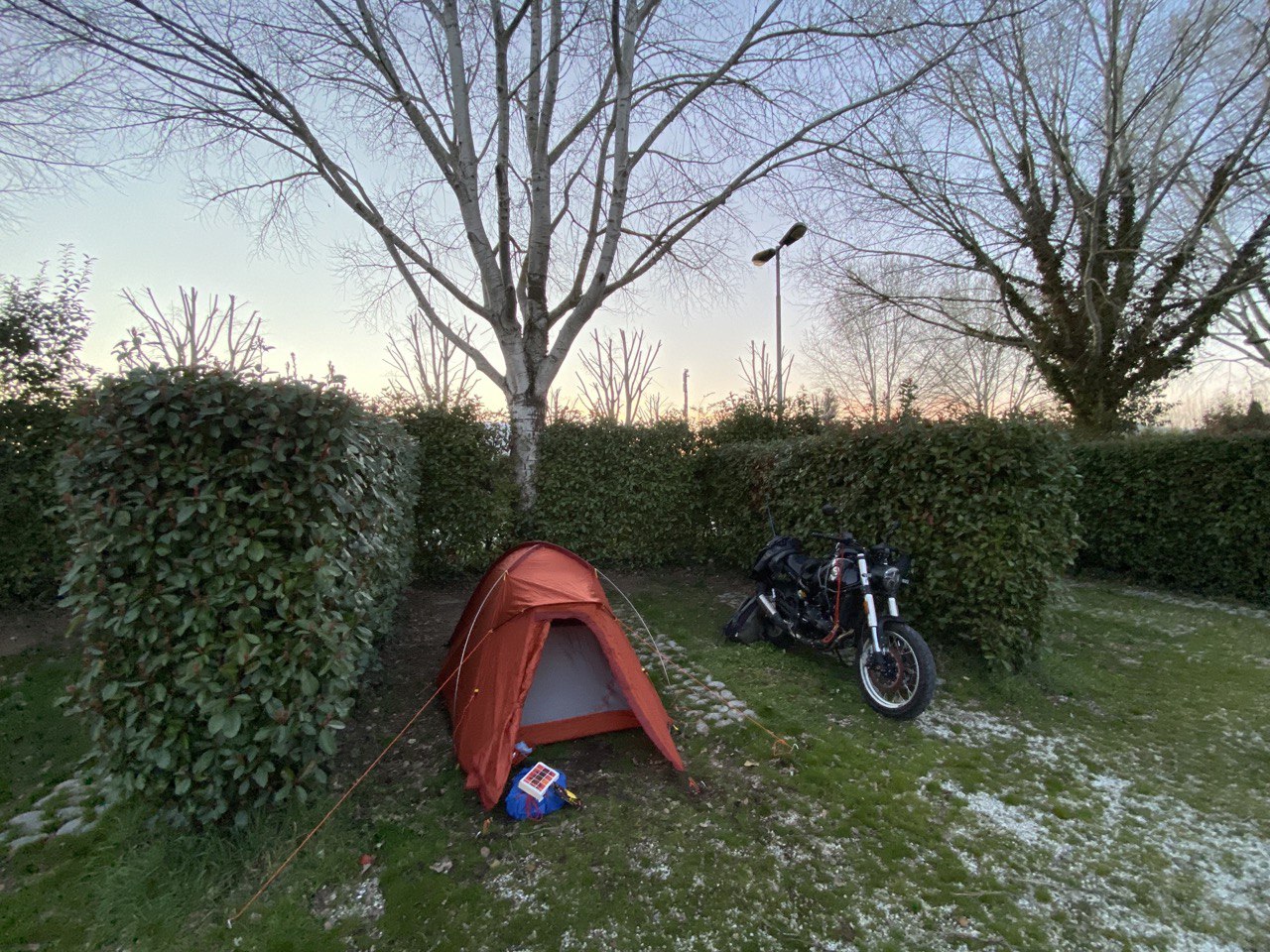
My first night camping in Lucca. The camping was officially closed since they were cutting branches, but the owner let me in since I was just a solo traveller - which meant that I had the whole camping all for me!
I think I have said enough enough for a single post. Now get out there - no good or bad weather, only good or bad will, and good or bad equipment.
Happy adventures!